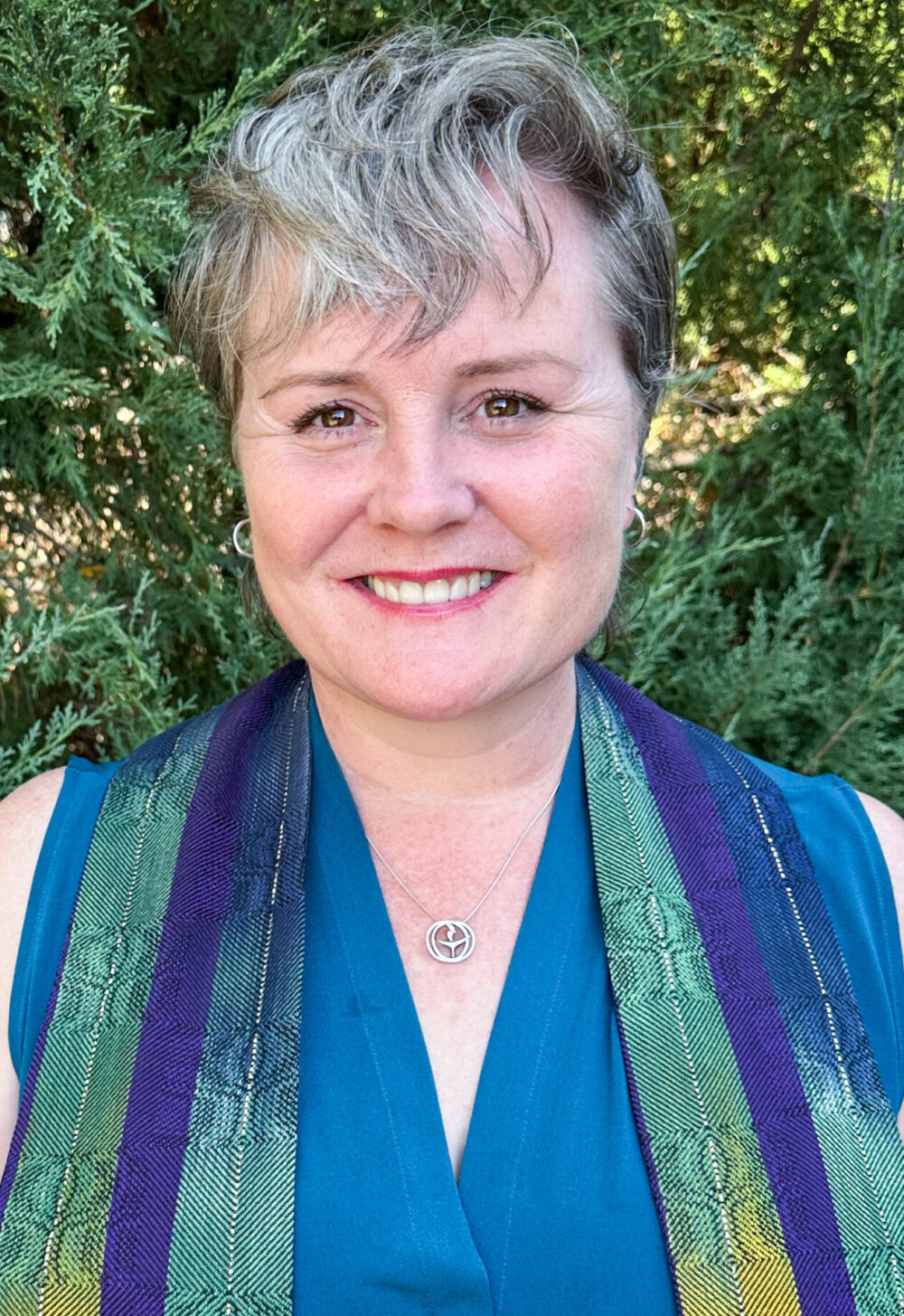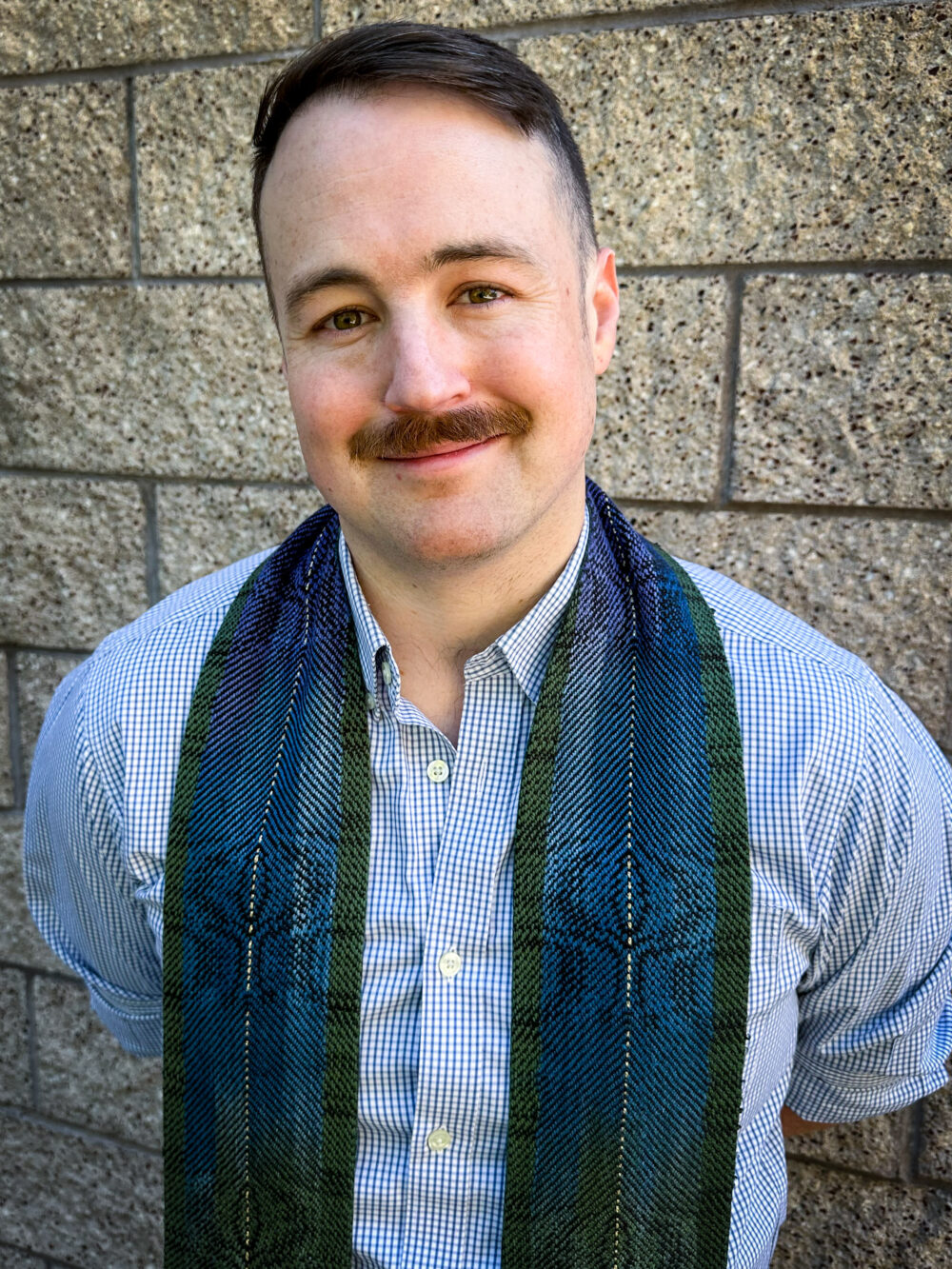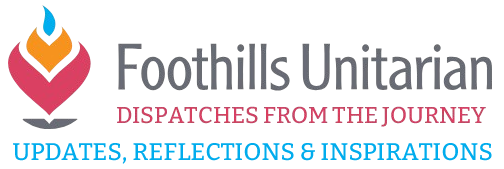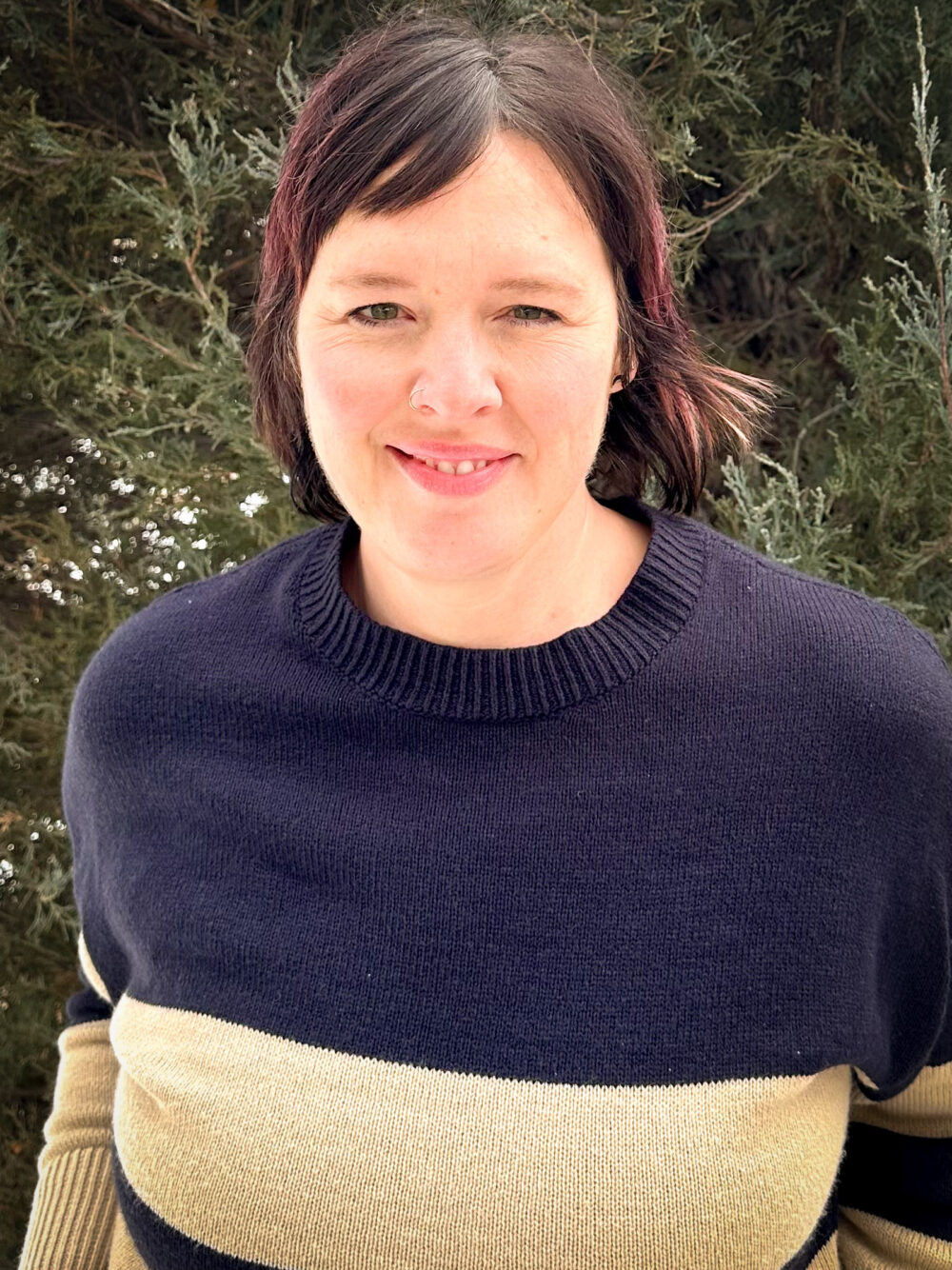We are thrilled to announce that the Assistant Minister Search Committee and the Rev. Gretchen Haley have enthusiastically selected Sean Neil-Barron to be our new Assistant Minister.

Our Process
In January, the Assistant Minister Search Committee (in its earliest form) held two congregational forums to consider together what we sought in a new Assistant Minister. Important attributes included a calling to pastoral care, interest in small group ministry, enthusiasm for the use of technology in UU ministry, and complementarity with Gretchen’s ministry. We agreed that we would hire (not call) an Assistant Minister for a period of one year, renewable for a second year. After that we can review and decide what we want to do for following years.
There’s a Denomination-wide process for recruiting and hiring ministers which has a seasonal cycle tied to the credentialing process for UU Ministers through the UUA. We advertised through the UUA process and began receiving applications almost immediately.
At our January meeting, the Board authorized a Search Committee for the Assistant Minister. It included Bonnie Inscho, Tim Pearson, Sara Edwards, and Scott Denning. We began meeting in late January and eventually considered sixteen applicants from all over the US and Canada.
From these candidates, we unanimously chose to invite one to Fort Collins – Sean Neil-Barron – in May. We met with him over three days and offered him the job on May 22. We were overjoyed when he accepted our offer!
Sean’s Background and Ministry
Sean recently completed his ministerial internship with the New England Region of the Unitarian Universalist Association. His responsibilities included working with more than 20 congregations in times of transition and conflict with a particular emphasis on congregational relevance in the 21st century. He also served as the project manager for FAITHIFY, the UU crowdfunding site – overseeing over a quarter of a million dollars being pledged to UU initiatives.
Sean is the Convener of Wellspring Boston, an entrepreneurial UU spiritual deepening initiative in the Boston Area and currently sits on the Board of Directors of UU Wellspring. He preaches regularly in Greater Boston and his writing has appeared in the UU World Magazine and on the UUA’s Worship Web. Sean’s most recent project is a podcast created in collaboration with UU Historian Rev. Dr. Susan Ritchie called “The Pamphlet,” aimed at uncovering UUs hidden histories.
Sean received his Master of Divinity from Harvard Divinity School and also holds a degree in Conflict Studies and Theology from Saint Paul University in Ottawa. Growing up on Treaty 7 land in Calgary, Alberta, Canada—a place not unlike Foothills in its geography and beauty—Sean found Unitarian Universalism as a queer youth and quickly fell in love with a community that explored together questions that matter. Having felt a call from a young age, it wasn’t until he found our faith that he realized that ministry was the call he had always felt. He remains connected to his colleagues and friends in the Canadian Unitarian movement. Sean has served as an OWL Facilitator, been on staff at the UU Goldmine Youth Leadership School, and has presented workshops on conflict resolution, contemporary church, and sexuality throughout the lifespan.
Sean’s ministry seeks to build communities of spiritual depth by harnessing the transformative power of our congregations to be places of formation, wonder, and service; addressing the deep spiritual wounds of our time: division, shame, and alienation.
Sean and his partner Charles will be joining us later in the summer with their dog Dollie. They enjoy the outdoors, biking, cooking, and tasting their way through new cities.
About Sean and his ministry fit at Foothills, by the Assistant Minister Search Committee
High on the list of qualities we sought in an assistant minister was the ability to effectively provide pastoral care. Sean has experience with pastoral care and considers it one of his strengths. He impressed us with his thoughtful responses on this topic and with a moving story about one of his pastoral care experiences. Sean has some great ideas about how pastoral care can be effective in larger congregations and he has a keen understanding of the differing pastoral needs that are present in church settings.
Sean is genuinely kind, considerate and caring. We all picked up on this in our multiple interactions with him. From the beginning Bonnie said, “I feel really comfortable with him,” and we all feel that way. He just gives off a comforting, kind energy.
He exhibits an ability to listen to what is being said, reframe and restate in a way that is particularly helpful. He is a deep listener, but that he also has a frame of reference and point-of-view. This will serve him well as he works to facilitate individuals and groups in a variety of settings.
Another thing we were looking for in an Asst. Minister was someone who could take on the role of further developing small group opportunities. Sean feels a call to build communities of spiritual depth, has a deep passion for developing adult spirituality, and has experience leading UU Wellspring and other groups. He clearly understands the importance of relationship building within spiritual groups and the congregation at large, with its potential for faith formation and life transformation.
Sean has been a proven leader is in congregational life and in his understanding of church governance. In his year at First Parish, Brookline, MA , he was charged with facilitating the updating of their policies and bylaws, which had not been updated to match the growth and changes in ministry over the past decade.Whether Sean is charged to help in that role at Foothills or not, his understanding of church governance and dynamics especially in times of transition, will no doubt be valuable to us.
Sean said he was drawn to our congregation because we are aspirational. He too is aspirational. You will soon see that he has a strong sense of vision. Part of his vision is to link the future with the past by building bridges between where we have been and where we will go. In this way he aspires to help UUs find relevance in the 21st century.
And speaking of bridges, Sean believes in bridging across age boundaries. When our team asked him how he would engage young adults and older congregants he told us that his goal would be to help create opportunities that would appeal to members across generations.
Sean’s work at Faithify has revolved around crowdfunding online. He will work on a viral social media campaign to collect UU stories. His hobbies include video games, “technology and gadgets,” and design theory. He even uses an AI personal assistant named “Amy.”
His groundedness in UU theology is evident. In our face-to-face conversations, we noted him bring UU beliefs and theology to the forefront in a number of different conversations. We appreciate his commitment to the UU beliefs and his ability to bring this point-of-view to bear in discussions related to being human and building community in the UU faith. He will add a great deal to our development as UU’s in the now and in the future.

Sean with the Search Committee after we’d made the invitation and he said yes.
We were struck, and we hope you will be struck, by the wisdom Sean exhibits — wisdom beyond his years. He has thought deeply about what it means to be a minister of a UU church. His theological insights and his genuine desire to lead our congregation on a spiritual journey convinced us that Sean is the right choice to be our assistant minister.
We read impressive testimonials from seven of Sean’s colleagues and as we prepared for our Skype and then in-person interviews, we were hopeful that we would see the qualities described: “commitment to our faith,” “instincts for congregations” “a natural minister,” and someone with “a maturity, self-awareness, and … understanding of the UU tradition that sets him apart.”
Rev. Sue Phillips, New England Region Lead for the UUA, wrote a very powerful and enthusiastic recommendation in support of Sean’s application. She wrote:
“Sean’s experience, wisdom, and commitment to Unitarian Universalism distinguish him not only from other young ministers just out of school, but from most ministers with many years of congregational experience … His instincts for congregations, how they work, and what they are capable of are outstanding for a person of any age. He is exactly the kind of ministerial candidate I would choose, combining as he does generationally astute vision with broad congregational experience that few older ministers can match. I have worked with hundreds of congregations and countless lay and ministerial leaders, and I can testify that Sean is among the most talented I’ve encountered.”
We saw these qualities and more. We felt in Sean’s presence that he is someone with innate and genuine inner wisdom – a “wise soul”. As the Rev. Sue Phillips described it, “What Sean has cannot be taught.” We think you will sense this too as you meet and work with him.
As Sean says in his video, there will be many opportunities in August and September to meet him and begin to get to know him. Look for info in the “Extra” and help us welcome our new minister as we begin this next new phase of our walk together at Foothills.

Getting silly with the Search Committee, Sean, Sean’s partner Charles, and Gretchen’s kids Gracie & Josef

Rev. Gretchen Haley has an audacious ambition for the liberal church, believing in its capacity to transform lives and our world by way of hyper-local relationships and partnerships that inspire the unleashing of courageous love. She oversees worship, community resourcing and outreach, and the intersectional work of our justice teams. She also serves as chief of staff, and ministry lead to the Board. In all of these, she is inspired by the commitment of the countless people who show up to do the sometimes-messy work of the church, and who are leading us to live into our mission for Northern Colorado as it is growing and changing. Her ministry is infused with her relentless curiosity about most things, especially the big stuff of theology, the beauty of creation, the magic of collaboration, and the joy of pop culture. She’s all in on adrienne maree brown’s emergent strategy, and finds solace in the trails in and around Fort Collins. She moved to Colorado from Washington state over 20 years ago for grad school in theatre, and knew immediately that she would never leave. She and her amazing partner, Carri, have 2 teenagers, Gracie and Josef, who both relish and resent being PKs, and who keep her grounded, frustrated, inspired, and humbled, everyday. She is basically obsessed with her two dogs, both large mutts, Charlie and Archer.
Responsible for: Worship, Community Resourcing and Outreach, Justice Ministries, and Congregational Leadership









